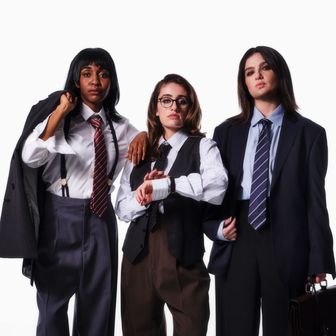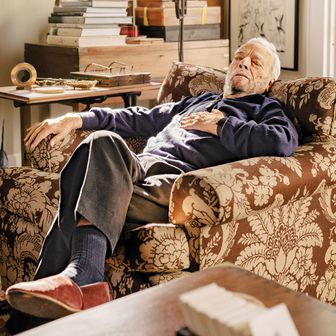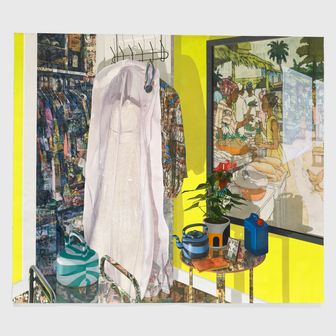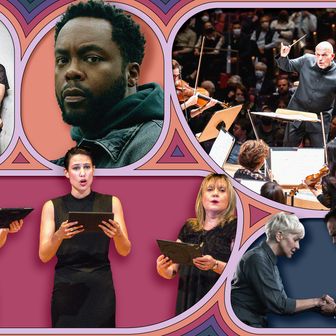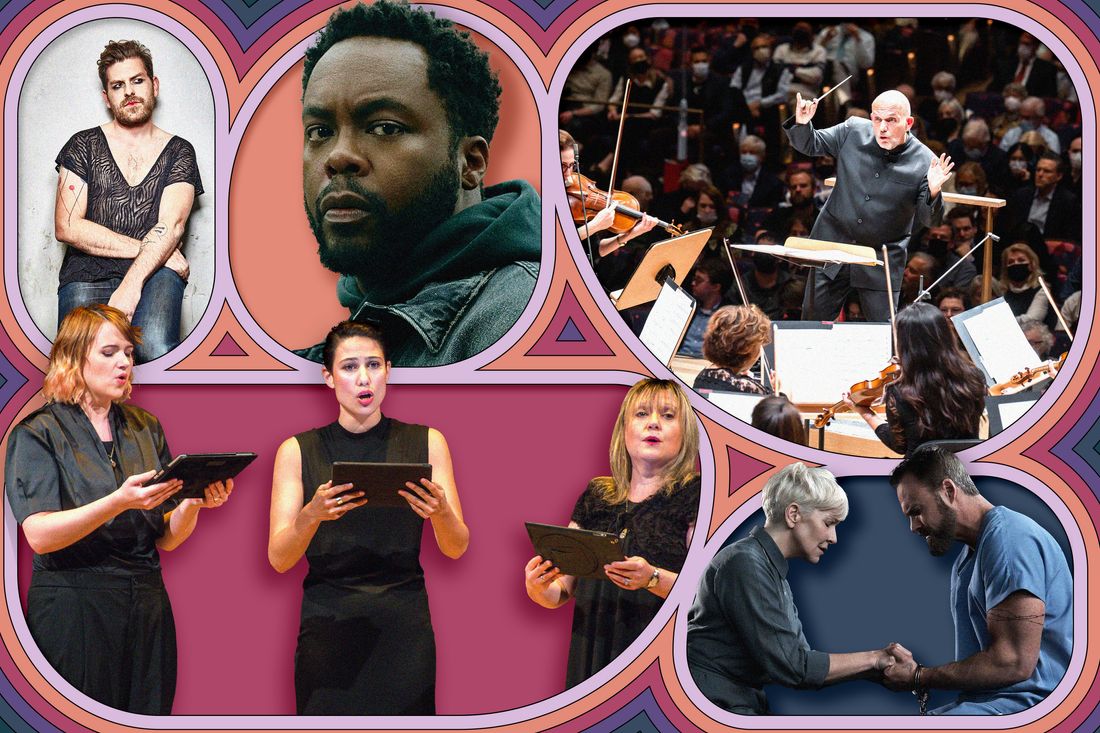
It’s time for new rules. The Metropolitan Opera, once fearful of upsetting its base with too much novelty, is now desperate enough to try a novel diet of new operas. The New York Philharmonic begins the multiyear process of rolling over from the Jaap van Zweden years to the Dudamera. And the Emerson String Quartet concludes its long farewell, leaving a vacuum of four-part eminence.
September
“John Zorn at 70”
The hardest-working man in New York’s contemporary music scene gets a three-part composer portrait, with performers that include the Jack Quartet, Zorn’s New Masada Quartet, and the swashbuckling soprano Barbara Hannigan.
Miller Theatre, September 21, October 19, and November 16.
Julianna Barwick
Slow choirs echoing in heavenly vaults, earthly rumbles, harmonic breezes—Barwick’s quasi-sacramental electronic loops evoke the great outdoors, even in tiny spaces.
National Sawdust, September 21.
Doppelganger, with tenor Jonas Kaufmann
There’s a special thrill that comes from hearing a big voice with a light touch in a small space. Kaufmann and pianist Helmut Deutsch perform Schubert’s song cycle Schwanengesang, along with other Schubert lieder, in a fully staged and lit one-tenor show directed by Claus Guth.
Park Avenue Armory, September 22–28.
Dead Man Walking
Jake Heggie’s opera about a death-row inmate and his anti-capital punishment champion Sister Helen Prejean has been performed just about everywhere except the Met. That changes when it opens the company’s season in a new production by Ivo van Hove, starring Joyce DiDonato and Ryan McKinny and conducted by Yannick Nézet-Séguin.
Metropolitan Opera, opening September 26.
Juilliard Orchestra
The composer-conductor-clarinetist Jörg Widmann leads the top-notch student orchestra in a performance of his own Violin Concerto No. 2 (with Stella Chen as soloist), plus works by Mendelssohn and Mozart.
Alice Tully Hall, September 26.
The Elements
Violinist Joshua Bell commissioned a fistful of composers (Jake Heggie, Jennifer Higdon, Edgar Meyer, Jessie Montgomery, and Kevin Puts) to write five movements that musically illustrate the classical elements: fire, water, air, earth, and space. Jaap van Zweden leads the New York Philharmonic in the U.S. premiere, on a program with Copland’s Third Symphony.
David Geffen Hall, September 29–October 1.
October
Chicago Symphony Orchestra
Riccardo Muti, the last of the old-time conductor-gurus, opens the Carnegie Hall season leading his ensemble of acolytes. The following evening, he conducts a program about his native Italy heard through the ears of German composers (Mendelssohn and Strauss), plus a Philip Glass premiere.
Carnegie Hall, October 4 and 5.
Steve Reich’s Jacob’s Ladder
The New York Philharmonic gives the world premiere of a rare new work by Steve Reich, with the ensemble Synergy Vocals, sandwiched between two of the most thoroughly classic classics in the orchestral repertoire (Beethoven’s Emperor Concerto, with Leif Ove Andsnes at the piano, and Schubert’s Unfinished Symphony).
David Geffen Hall, October 5–7.
Music of New Amsterdam
The Dutch early-music ensemble Camerata Trajectina, evokes the sounds of Manhattan in the 17th century, when its parlors and coffeehouses were filled with music and poetry from the mother country.
Morgan Library and Museum, October 11
Ligeti at 100
The Hungarian composer György Ligeti, one of the most wittily inventive composers of our time, would have been a century old this year, and the New York Philharmonic doles out its celebrations over three programs covering his Romanian Concerto, the astonishing Piano Concerto, played by Pierre-Laurent Aimard, and one of his best known works, Atmosphères.
David Geffen Hall, October 19-November 25.
Un Ballo in Maschera
David Alden’s production of Verdi’s dark drama isn’t new, but it might just as well be: It opened at the Metropolitan Opera in 2012, returned for a few performances in 2015, and hasn’t been heard from since. Finally, though, it returns with tenor Charles Castronovo making his debut in the role of the love-mad Swedish king.
Metropolitan Opera, opening October 20.
The Emerson String Quartet’s farewell
The dean of string quartets, founded in 1976, has been making its adieux for nearly two years, but this time it’s really bringing down the curtain with two performances of Beethoven’s agonized last quartets. The cellist David Finckel (who played with the group for more than three decades) rejoins for another valedictory masterpiece, Schubert’s Quintet in C major.
Alice Tully Hall, October 21 & 22.
Dorothea
Composer-singer Ted Hearne plunges into the poetry of Dorothea Lasky with a staged song cycle that resembles pop tunes put through a Dada filter.
Zankel Hall, October 27.
Vijay Iyer Piano Concerto
The musical polymath who started out as a jazz pianist but who flows among categories and genres, has written a concerto for a pianist other than himself: Shai Wosner, who gives its premiere with the East Coast Chamber Orchestra, in the perpetually indispensable People’s Symphony Concerts series.
Washington Irving High School, October 28.
November
Henry Purcell’s The Fairy Queen
Les Arts Florissants, the legendary specialists in music of the baroque, perform Purcell’s opera in a new production directed and choreographed by Mourad Merzouki. Paul Agnew conducts the orchestra and its choir Le Jardin des Voix. Merzouki’s Compagnie Käfig dance corps is reinforced by two Juilliard dancers.
Alice Tully Hall, November 2.
“Kronos Quartet: Five Decades”
The forever-young experimentalists of the string quartet world have been innovating for half a century, long enough that its members must long ago have lost track of how many composers they’ve commissioned and friends they’ve performed with. A big chunk of that history will be onstage for the jubilee program, which includes new works by Michael Gordon and Gabriella Smith.
Carnegie Hall, November 3.
Watch Night
Choreographer Bill T. Jones works with librettist Marc Bamuthi Joseph and composer Tamar-kali to create a multimedia dramatization of the all-too-common convergence of hatred, violence, and collective rage.
Perelman Performing Arts Center, November 3-18.
X: The Life and Times of Malcolm X
Baritone Will Liverman really carried Terence Blanchard’s Fire Shut Up in My Bones when it opened the Metropolitan Opera season in 2021; now he’s back to sing the title role in a new production of Anthony Davis’s 1986 opera about Malcolm X.
Metropolitan Opera, opens November 3.
“Beijing Guitar Duo”o
There aren’t many ideal venues for the quiet classical guitar, but the Y’s small, freshly renovated Buttenwieser Hall is one. The duo of Meng Su and Yameng Wang perform music by Albéniz, Pizzolla, and Debussy.
92nd Street Y, November 4.
Florencia en el Amazonas
The Metropolitan Opera’s pivot to fresh fare, a bold attempt to attract audiences who might not get excited by a fresh take on La Bohème, benefits from all the years in which new operas were heard everywhere but at the Met. One of those was Daniel Catán’s 1996 work in Spanish about an opera singer who sails up the Amazon. The new production, by Mary Zimmerman, stars Ailyn Pérez in the title role.
Metropolitan Opera, opens November 16.
Gil Shaham, violin, and Akira Eguchi, piano
The frequent partners play Fauré’s irresistible A-major sonata, Avner Dorman’s Nigunim (which has become something of a Shaham classic), plus an assortment of new and old music.
92nd Street Y, November 17.
“Philip Glass’s Complete Piano Etudes”
The composer known for immense spectacles and vast symphonies has a more intimate side: 20 etudes for piano composed over many years, like entries in a musical journal. A passel of pianists—including Timo Andres, Inon Barnatan, Lara Downes, and more—plays them all in one intensely focused evening.
David Geffen Hall, November 19.
Daniel Barenboim & Staatskapelle Berlin
The 80-year-old conductor-pianist and all-around musical dynamo, who’s been whipping around the world’s stages since he was a boy, has lately been slowed by poor health. Still, with any luck, he’ll be leading the orchestra that he ran for 31 years in two programs covering all four of Brahms’s symphonies.
Carnegie Hall, November 30 & December 1.
December
“A Midwinter Feast”
The trio ModernMedieval Voices inherits the mantle of the retired Anonymous 4 in the minuscule but distinguished category of all-female a cappella early-music vocal ensembles. The group ushers in the holidays with a program of medieval and Renaissance songs and carols from the British Isles.
The Cloisters, December 16.
“Circle Songs”
Taking advantage of the new Perelman Arts Center’s flexible configurations, countertenor Anthony Roth Costanzo and the Knights position musicians and audiences in the round for their idiosyncratic version of a holiday concert.
Perelman PAC, December 20.


